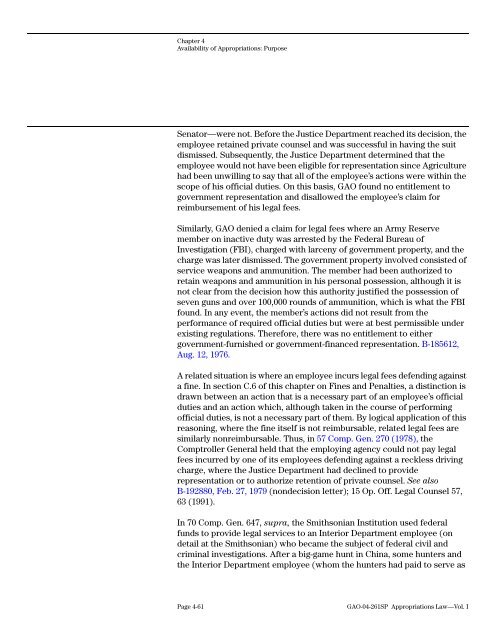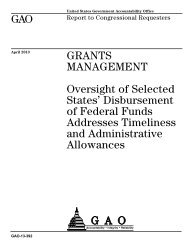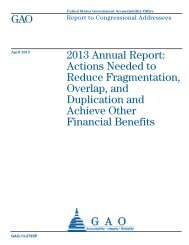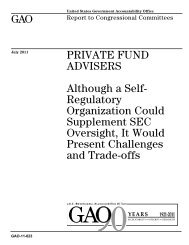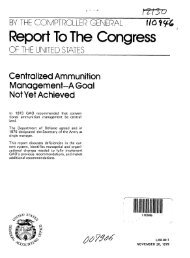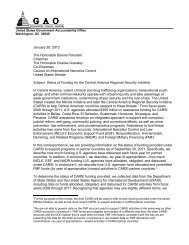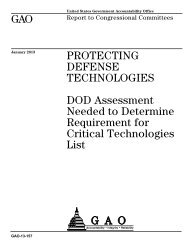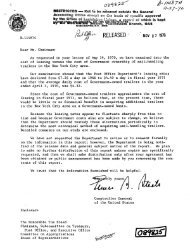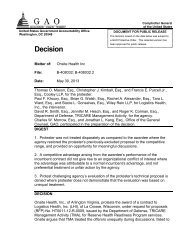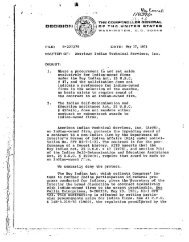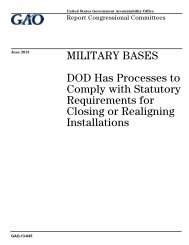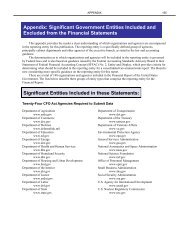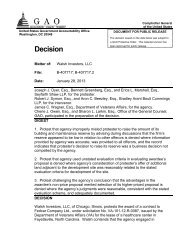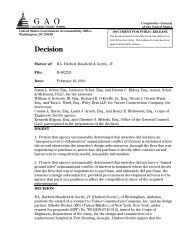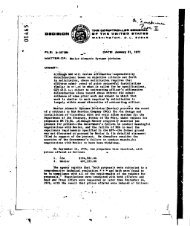- Page 1 and 2:
GAO January 2004 GAO-04-261SP Unite
- Page 3 and 4:
Foreword We are pleased to present
- Page 5 and 6:
Detailed Table of Contents Volume I
- Page 7 and 8:
Chapter 3 Agency Regulations and Ad
- Page 9 and 10:
Contents (1) 31 U.S.C. § 1345 . .
- Page 11 and 12:
Contents (7) Pending legislation: P
- Page 13 and 14:
Contents 6. Replacement Contracts .
- Page 15 and 16:
Chapter 1 Introduction A. Nature of
- Page 17 and 18:
B. The Congressional “Power of th
- Page 19 and 20:
Chapter 1 Introduction As these sta
- Page 21 and 22:
Chapter 1 Introduction subsystem un
- Page 23 and 24:
Chapter 1 Introduction While the ex
- Page 25 and 26:
Chapter 1 Introduction It would app
- Page 27 and 28:
Chapter 1 Introduction Implementati
- Page 29 and 30:
Chapter 1 Introduction Committee wa
- Page 31 and 32:
Chapter 1 Introduction The first ma
- Page 33 and 34:
Chapter 1 Introduction replaced the
- Page 35 and 36:
2. GAO’s Role in the Process Chap
- Page 37 and 38:
Chapter 1 Introduction and the Secr
- Page 39 and 40:
1. Executive Budget Formulation and
- Page 41 and 42:
Chapter 1 Introduction Departments
- Page 43 and 44:
Chapter 1 Introduction As individua
- Page 45 and 46:
3. Budget Execution and Control Cha
- Page 47 and 48:
Chapter 1 Introduction A rescission
- Page 49 and 50:
4. Audit and Review Chapter 1 Intro
- Page 51 and 52:
Chapter 1 Introduction 5. Account C
- Page 53 and 54:
Chapter 1 Introduction The Dockery
- Page 55 and 56:
Chapter 1 Introduction by e-mail, r
- Page 57 and 58:
Chapter 1 Introduction (28 U.S.C.
- Page 59 and 60:
Chapter 1 Introduction its opinion,
- Page 61 and 62:
Chapter 1 Introduction consisted of
- Page 63 and 64:
c. Note on Title 31 Recodification
- Page 65 and 66:
Chapter 2 The Legal Framework A. Ap
- Page 67 and 68:
Chapter 2 The Legal Framework Chapt
- Page 69 and 70:
Chapter 2 The Legal Framework accou
- Page 71 and 72:
Chapter 2 The Legal Framework As no
- Page 73 and 74:
Chapter 2 The Legal Framework some
- Page 75 and 76:
Chapter 2 The Legal Framework Statu
- Page 77 and 78:
Chapter 2 The Legal Framework b. En
- Page 79 and 80:
d. Classification Based on Availabi
- Page 81 and 82:
Chapter 2 The Legal Framework prope
- Page 83 and 84:
Chapter 2 The Legal Framework Vario
- Page 85 and 86:
2. Specific versus General Appropri
- Page 87 and 88:
. Two Appropriations Available for
- Page 89 and 90:
Chapter 2 The Legal Framework betwe
- Page 91 and 92:
Chapter 2 The Legal Framework the P
- Page 93 and 94:
Chapter 2 The Legal Framework appro
- Page 95 and 96:
Chapter 2 The Legal Framework and i
- Page 97 and 98:
4. General Provisions: When Constru
- Page 99 and 100:
Chapter 2 The Legal Framework State
- Page 101 and 102:
Chapter 2 The Legal Framework Labor
- Page 103 and 104:
Chapter 2 The Legal Framework livin
- Page 105 and 106:
Chapter 2 The Legal Framework subje
- Page 107 and 108:
Chapter 2 The Legal Framework autho
- Page 109 and 110:
Chapter 2 The Legal Framework which
- Page 111 and 112:
Chapter 2 The Legal Framework held
- Page 113 and 114:
Chapter 2 The Legal Framework for C
- Page 115 and 116:
Chapter 2 The Legal Framework has c
- Page 117 and 118:
Chapter 2 The Legal Framework to fo
- Page 119 and 120:
Chapter 2 The Legal Framework there
- Page 121 and 122:
Chapter 2 The Legal Framework autho
- Page 123 and 124:
f. Two Statutes Enacted on Same Day
- Page 125 and 126:
g. Ratification by Appropriation Ch
- Page 127 and 128:
Chapter 2 The Legal Framework “ [
- Page 129 and 130:
Chapter 2 The Legal Framework and a
- Page 131 and 132:
Chapter 2 The Legal Framework we di
- Page 133 and 134:
Chapter 2 The Legal Framework Steve
- Page 135 and 136:
D. Statutory Interpretation: Determ
- Page 137 and 138:
Chapter 2 The Legal Framework whole
- Page 139 and 140:
Chapter 2 The Legal Framework Aldri
- Page 141 and 142:
Chapter 2 The Legal Framework As a
- Page 143 and 144:
Chapter 2 The Legal Framework In a
- Page 145 and 146:
Chapter 2 The Legal Framework produ
- Page 147 and 148:
4. Statutory Aids to Construction a
- Page 149 and 150:
5. Canons of Statutory Construction
- Page 151 and 152:
. Give Effect to All the Language:
- Page 153 and 154:
c. Apply the Common Meaning of Word
- Page 155 and 156:
Chapter 2 The Legal Framework In Wa
- Page 157 and 158:
Chapter 2 The Legal Framework Bank
- Page 159 and 160:
Chapter 2 The Legal Framework “[W
- Page 161 and 162:
Chapter 2 The Legal Framework Supre
- Page 163 and 164:
Chapter 2 The Legal Framework legis
- Page 165 and 166:
Chapter 2 The Legal Framework moder
- Page 167 and 168:
Chapter 2 The Legal Framework is mo
- Page 169 and 170:
d. Development of the Statutory Lan
- Page 171 and 172:
Chapter 2 The Legal Framework “We
- Page 173 and 174:
Chapter 2 The Legal Framework The C
- Page 175 and 176:
Chapter 2 The Legal Framework This
- Page 177 and 178:
d. Presumption against Waiver of So
- Page 179 and 180:
Chapter 3 Agency Regulations and Ad
- Page 181 and 182:
Chapter 3 Agency Regulations and Ad
- Page 183 and 184:
a. The Informal Rulemaking Process
- Page 185 and 186:
Chapter 3 Agency Regulations and Ad
- Page 187 and 188:
Chapter 3 Agency Regulations and Ad
- Page 189 and 190:
Chapter 3 Agency Regulations and Ad
- Page 191 and 192:
Chapter 3 Agency Regulations and Ad
- Page 193 and 194:
Chapter 3 Agency Regulations and Ad
- Page 195 and 196:
2. Regulations May Not Exceed Statu
- Page 197 and 198:
3. “Force and Effect of Law” Ch
- Page 199 and 200:
Chapter 3 Agency Regulations and Ad
- Page 201 and 202:
Chapter 3 Agency Regulations and Ad
- Page 203 and 204:
5. Amendment of Regulations Chapter
- Page 205 and 206:
Chapter 3 Agency Regulations and Ad
- Page 207 and 208:
B. Agency Administrative Interpreta
- Page 209 and 210:
Chapter 3 Agency Regulations and Ad
- Page 211 and 212:
Chapter 3 Agency Regulations and Ad
- Page 213 and 214:
Chapter 3 Agency Regulations and Ad
- Page 215 and 216:
Chapter 3 Agency Regulations and Ad
- Page 217 and 218:
Chapter 3 Agency Regulations and Ad
- Page 219 and 220:
C. Administrative Discretion Chapte
- Page 221 and 222:
2. Discretion Is Not Unlimited Chap
- Page 223 and 224:
Chapter 3 Agency Regulations and Ad
- Page 225 and 226:
Chapter 3 Agency Regulations and Ad
- Page 227 and 228:
Chapter 3 Agency Regulations and Ad
- Page 229 and 230:
Chapter 3 Agency Regulations and Ad
- Page 231 and 232:
Chapter 3 Agency Regulations and Ad
- Page 233 and 234:
Chapter 4 Availability of Appropria
- Page 235 and 236:
Chapter 4 Availability of Appropria
- Page 237 and 238:
Chapter 4 Availability of Appropria
- Page 239 and 240:
Chapter 4 Availability of Appropria
- Page 241 and 242: 2. Determining Authorized Purposes
- Page 243 and 244: . Specific Purpose Stated in Approp
- Page 245 and 246: Chapter 4 Availability of Appropria
- Page 247 and 248: Chapter 4 Availability of Appropria
- Page 249 and 250: 4. Termination of Program Chapter 4
- Page 251 and 252: B. The “Necessary Expense” Doct
- Page 253 and 254: Chapter 4 Availability of Appropria
- Page 255 and 256: Chapter 4 Availability of Appropria
- Page 257 and 258: Chapter 4 Availability of Appropria
- Page 259 and 260: . Expenditure Otherwise Prohibited
- Page 261 and 262: c. Expenditure Otherwise Provided F
- Page 263 and 264: Chapter 4 Availability of Appropria
- Page 265 and 266: Chapter 4 Availability of Appropria
- Page 267 and 268: C. Specific Purpose Authorities and
- Page 269 and 270: Chapter 4 Availability of Appropria
- Page 271 and 272: Chapter 4 Availability of Appropria
- Page 273 and 274: Chapter 4 Availability of Appropria
- Page 275 and 276: Chapter 4 Availability of Appropria
- Page 277 and 278: Chapter 4 Availability of Appropria
- Page 279 and 280: Chapter 4 Availability of Appropria
- Page 281 and 282: Chapter 4 Availability of Appropria
- Page 283 and 284: 3. Attorney’s Fees Chapter 4 Avai
- Page 285 and 286: Chapter 4 Availability of Appropria
- Page 287 and 288: c. Suits Against Government Officer
- Page 289 and 290: Chapter 4 Availability of Appropria
- Page 291: Chapter 4 Availability of Appropria
- Page 295 and 296: Chapter 4 Availability of Appropria
- Page 297 and 298: Chapter 4 Availability of Appropria
- Page 299 and 300: d. Suits Unrelated to Federal Emplo
- Page 301 and 302: Chapter 4 Availability of Appropria
- Page 303 and 304: Chapter 4 Availability of Appropria
- Page 305 and 306: Chapter 4 Availability of Appropria
- Page 307 and 308: Chapter 4 Availability of Appropria
- Page 309 and 310: Chapter 4 Availability of Appropria
- Page 311 and 312: Chapter 4 Availability of Appropria
- Page 313 and 314: Chapter 4 Availability of Appropria
- Page 315 and 316: Chapter 4 Availability of Appropria
- Page 317 and 318: i. Public Participation in Administ
- Page 319 and 320: Chapter 4 Availability of Appropria
- Page 321 and 322: Chapter 4 Availability of Appropria
- Page 323 and 324: Chapter 4 Availability of Appropria
- Page 325 and 326: Chapter 4 Availability of Appropria
- Page 327 and 328: Chapter 4 Availability of Appropria
- Page 329 and 330: Chapter 4 Availability of Appropria
- Page 331 and 332: Chapter 4 Availability of Appropria
- Page 333 and 334: Chapter 4 Availability of Appropria
- Page 335 and 336: . Food for Government Employees Cha
- Page 337 and 338: Chapter 4 Availability of Appropria
- Page 339 and 340: Chapter 4 Availability of Appropria
- Page 341 and 342: Chapter 4 Availability of Appropria
- Page 343 and 344:
Chapter 4 Availability of Appropria
- Page 345 and 346:
Chapter 4 Availability of Appropria
- Page 347 and 348:
Chapter 4 Availability of Appropria
- Page 349 and 350:
Chapter 4 Availability of Appropria
- Page 351 and 352:
Chapter 4 Availability of Appropria
- Page 353 and 354:
Chapter 4 Availability of Appropria
- Page 355 and 356:
d. Entertainment of Nongovernment P
- Page 357 and 358:
Chapter 4 Availability of Appropria
- Page 359 and 360:
Chapter 4 Availability of Appropria
- Page 361 and 362:
Chapter 4 Availability of Appropria
- Page 363 and 364:
Chapter 4 Availability of Appropria
- Page 365 and 366:
Chapter 4 Availability of Appropria
- Page 367 and 368:
f. Reception and Representation Fun
- Page 369 and 370:
Chapter 4 Availability of Appropria
- Page 371 and 372:
Chapter 4 Availability of Appropria
- Page 373 and 374:
Chapter 4 Availability of Appropria
- Page 375 and 376:
Chapter 4 Availability of Appropria
- Page 377 and 378:
Chapter 4 Availability of Appropria
- Page 379 and 380:
Chapter 4 Availability of Appropria
- Page 381 and 382:
Chapter 4 Availability of Appropria
- Page 383 and 384:
Chapter 4 Availability of Appropria
- Page 385 and 386:
Chapter 4 Availability of Appropria
- Page 387 and 388:
8. Gifts and Awards Chapter 4 Avail
- Page 389 and 390:
Chapter 4 Availability of Appropria
- Page 391 and 392:
Chapter 4 Availability of Appropria
- Page 393 and 394:
Chapter 4 Availability of Appropria
- Page 395 and 396:
Chapter 4 Availability of Appropria
- Page 397 and 398:
Chapter 4 Availability of Appropria
- Page 399 and 400:
Chapter 4 Availability of Appropria
- Page 401 and 402:
Chapter 4 Availability of Appropria
- Page 403 and 404:
9. Guard Services: Anti- Pinkerton
- Page 405 and 406:
Chapter 4 Availability of Appropria
- Page 407 and 408:
10. Insurance Chapter 4 Availabilit
- Page 409 and 410:
Chapter 4 Availability of Appropria
- Page 411 and 412:
Chapter 4 Availability of Appropria
- Page 413 and 414:
Chapter 4 Availability of Appropria
- Page 415 and 416:
Chapter 4 Availability of Appropria
- Page 417 and 418:
Chapter 4 Availability of Appropria
- Page 419 and 420:
Chapter 4 Availability of Appropria
- Page 421 and 422:
Chapter 4 Availability of Appropria
- Page 423 and 424:
Chapter 4 Availability of Appropria
- Page 425 and 426:
Chapter 4 Availability of Appropria
- Page 427 and 428:
Chapter 4 Availability of Appropria
- Page 429 and 430:
Chapter 4 Availability of Appropria
- Page 431 and 432:
Chapter 4 Availability of Appropria
- Page 433 and 434:
Chapter 4 Availability of Appropria
- Page 435 and 436:
Chapter 4 Availability of Appropria
- Page 437 and 438:
Chapter 4 Availability of Appropria
- Page 439 and 440:
Chapter 4 Availability of Appropria
- Page 441 and 442:
Chapter 4 Availability of Appropria
- Page 443 and 444:
Chapter 4 Availability of Appropria
- Page 445 and 446:
Chapter 4 Availability of Appropria
- Page 447 and 448:
Chapter 4 Availability of Appropria
- Page 449 and 450:
Chapter 4 Availability of Appropria
- Page 451 and 452:
Chapter 4 Availability of Appropria
- Page 453 and 454:
Chapter 4 Availability of Appropria
- Page 455 and 456:
Chapter 4 Availability of Appropria
- Page 457 and 458:
Chapter 4 Availability of Appropria
- Page 459 and 460:
Chapter 4 Availability of Appropria
- Page 461 and 462:
f. Advertising and the Employment o
- Page 463 and 464:
Chapter 4 Availability of Appropria
- Page 465 and 466:
Chapter 4 Availability of Appropria
- Page 467 and 468:
Chapter 4 Availability of Appropria
- Page 469 and 470:
Chapter 4 Availability of Appropria
- Page 471 and 472:
Chapter 4 Availability of Appropria
- Page 473 and 474:
Chapter 4 Availability of Appropria
- Page 475 and 476:
Chapter 4 Availability of Appropria
- Page 477 and 478:
c. Health, Medical Care and Treatme
- Page 479 and 480:
Chapter 4 Availability of Appropria
- Page 481 and 482:
Chapter 4 Availability of Appropria
- Page 483 and 484:
Chapter 4 Availability of Appropria
- Page 485 and 486:
Chapter 4 Availability of Appropria
- Page 487 and 488:
Chapter 4 Availability of Appropria
- Page 489 and 490:
Chapter 4 Availability of Appropria
- Page 491 and 492:
Chapter 4 Availability of Appropria
- Page 493 and 494:
Chapter 4 Availability of Appropria
- Page 495 and 496:
Chapter 4 Availability of Appropria
- Page 497 and 498:
Chapter 4 Availability of Appropria
- Page 499 and 500:
Chapter 4 Availability of Appropria
- Page 501 and 502:
Chapter 4 Availability of Appropria
- Page 503 and 504:
j. Miscellaneous Personal Expenses
- Page 505 and 506:
Chapter 4 Availability of Appropria
- Page 507 and 508:
Chapter 4 Availability of Appropria
- Page 509 and 510:
Chapter 4 Availability of Appropria
- Page 511 and 512:
Chapter 4 Availability of Appropria
- Page 513 and 514:
. Missing Government Employees Chap
- Page 515 and 516:
Chapter 4 Availability of Appropria
- Page 517 and 518:
e. Rewards to Government Employees
- Page 519 and 520:
Chapter 4 Availability of Appropria
- Page 521 and 522:
. Tax on Business Transactions Wher
- Page 523 and 524:
Chapter 4 Availability of Appropria
- Page 525 and 526:
Chapter 4 Availability of Appropria
- Page 527 and 528:
Chapter 4 Availability of Appropria
- Page 529 and 530:
Chapter 4 Availability of Appropria
- Page 531 and 532:
Chapter 4 Availability of Appropria
- Page 533 and 534:
d. Taxes Paid by Federal Employees
- Page 535 and 536:
Chapter 4 Availability of Appropria
- Page 537 and 538:
Chapter 4 Availability of Appropria
- Page 539 and 540:
e. Refund and Recovery of Tax Impro
- Page 541 and 542:
Chapter 4 Availability of Appropria
- Page 543 and 544:
Chapter 4 Availability of Appropria
- Page 545 and 546:
Chapter 4 Availability of Appropria
- Page 547 and 548:
Chapter 4 Availability of Appropria
- Page 549 and 550:
Chapter 4 Availability of Appropria
- Page 551 and 552:
Chapter 4 Availability of Appropria
- Page 553 and 554:
Chapter 5 Availability of Appropria
- Page 555 and 556:
Chapter 5 Availability of Appropria
- Page 557 and 558:
Chapter 5 Availability of Appropria
- Page 559 and 560:
. Multiple Year Appropriations Chap
- Page 561 and 562:
3. Obligation or Expenditure Prior
- Page 563 and 564:
B. The Bona Fide Needs Rule 1. Back
- Page 565 and 566:
Chapter 5 Availability of Appropria
- Page 567 and 568:
Chapter 5 Availability of Appropria
- Page 569 and 570:
Chapter 5 Availability of Appropria
- Page 571 and 572:
Chapter 5 Availability of Appropria
- Page 573 and 574:
Chapter 5 Availability of Appropria
- Page 575 and 576:
5. Services Rendered beyond the Fis
- Page 577 and 578:
Chapter 5 Availability of Appropria
- Page 579 and 580:
Chapter 5 Availability of Appropria
- Page 581 and 582:
Chapter 5 Availability of Appropria
- Page 583 and 584:
Chapter 5 Availability of Appropria
- Page 585 and 586:
7. Contract Modifications and Amend
- Page 587 and 588:
Chapter 5 Availability of Appropria
- Page 589 and 590:
8. Multiyear Contracts Chapter 5 Av
- Page 591 and 592:
. Multiple Year and No-Year Appropr
- Page 593 and 594:
Chapter 5 Availability of Appropria
- Page 595 and 596:
d. Contracts with No Financial Obli
- Page 597 and 598:
Chapter 5 Availability of Appropria
- Page 599 and 600:
c. Examples of Agency- Specific Mul
- Page 601 and 602:
Chapter 5 Availability of Appropria
- Page 603 and 604:
Chapter 5 Availability of Appropria
- Page 605 and 606:
Chapter 5 Availability of Appropria
- Page 607 and 608:
Chapter 5 Availability of Appropria
- Page 609 and 610:
Chapter 5 Availability of Appropria
- Page 611 and 612:
Chapter 5 Availability of Appropria
- Page 613 and 614:
Chapter 5 Availability of Appropria
- Page 615 and 616:
Chapter 5 Availability of Appropria
- Page 617 and 618:
5. Other Governmental Entities Chap
- Page 619 and 620:
D. Disposition of Appropriation Bal
- Page 621 and 622:
Chapter 5 Availability of Appropria
- Page 623 and 624:
3. Expired Appropriation Accounts C
- Page 625 and 626:
4. Closed Appropriation Accounts Ch
- Page 627 and 628:
5. Exemptions from the Account Clos
- Page 629 and 630:
Chapter 5 Availability of Appropria
- Page 631 and 632:
Chapter 5 Availability of Appropria
- Page 633 and 634:
E. Effect of Litigation on Period o
- Page 635 and 636:
Chapter 5 Availability of Appropria
- Page 637 and 638:
Chapter 5 Availability of Appropria
- Page 639 and 640:
Chapter 5 Availability of Appropria
- Page 641 and 642:
Chapter 5 Availability of Appropria


